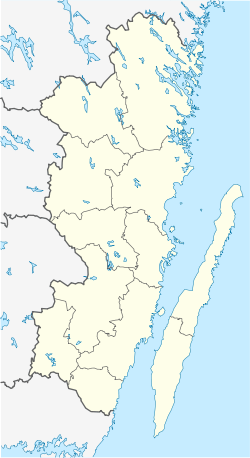Kalmar | |
|---|---|
 Clockwise from top: aerial view of the Kalmar Cathedral, Kalmar Castle, the old water tower in central Kalmar, Öland Bridge and the water tower in Berga. | |
| Coordinates: 56°39′41″N 16°21′46″E / 56.66139°N 16.36278°E | |
| Country | |
| Province | Småland |
| County | Kalmar County |
| Municipality | Kalmar Municipality |
| Charter | 1100 |
| Area | |
• City | 19.50 km2 (7.53 sq mi) |
| Elevation | 8 m (26 ft) |
| Population (2020)[1] | |
• City | 41,852 |
| • Density | 1,866/km2 (4,830/sq mi) |
| • Metro | 72,098 |
| Time zone | UTC+1 (CET) |
| • Summer (DST) | UTC+2 (CEST) |
| Postal code | 39x xx |
| Area code | (+46) 480 |
| Website | kalmar |
Kalmar (/ˈkælmɑːr/, US also /ˈkɑːlmɑːr/,[2][3] Swedish: [ˈkǎlmar] ) is a city in the southeast of Sweden, situated by the Baltic Sea. It had 41,388 inhabitants in 2020[1] and is the seat of Kalmar Municipality. It is also the capital of Kalmar County, which comprises 12 municipalities with a total of 236,399 inhabitants (2015). Kalmar is the third largest urban area in the province and cultural region of Småland.
From the thirteenth to the seventeenth centuries, Kalmar was one of Sweden's most important cities. Its name was until the second half of the nineteenth century spelled Calmar. Between 1602 and 1913 it was the episcopal see of Kalmar Diocese, with a bishop, and the Kalmar Cathedral from 1702 is an example of classicistic architecture. It became a fortified city, with the Kalmar Castle as the center. After the Treaty of Roskilde in 1658, Kalmar's importance diminished, until the industry sector was initiated in the 19th century. The city is home to parts of Linnaeus University.
The city plays host to the Live at Heart festival, one of Sweden's largest musical showcase events.
Kalmar is adjacent to the main route to the island of Öland over the Öland Bridge.
- ^ a b c "Tätorternas landareal, folkmängd och invånare per km2 2005 och 2010" (in Swedish). Statistics Sweden. 14 December 2011. Archived from the original on 27 January 2012. Retrieved 10 January 2012.
- ^ "Kalmar"[dead link] (US) and "Kalmar". Lexico UK English Dictionary. Oxford University Press. Archived from the original on 4 August 2022.
- ^ "Kalmar". Merriam-Webster.com Dictionary. Merriam-Webster. Retrieved 31 January 2019.


